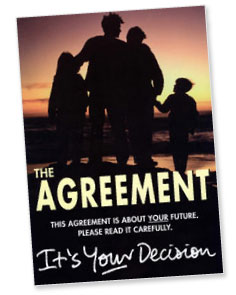The Belfast Agreement/Good Friday Agreement 1998
 The Belfast Agreement is also known as the Good Friday Agreement, because it was reached on Good Friday, 10 April 1998. It was an agreement between the British and Irish governments, and most of the political parties in Northern Ireland, on how Northern Ireland should be governed. The talks leading to the Agreement addressed issues which had caused conflict during previous decades. The aim was establish a new, devolved governmentfor Northern Ireland in which unionists and nationalists would share power.
The Belfast Agreement is also known as the Good Friday Agreement, because it was reached on Good Friday, 10 April 1998. It was an agreement between the British and Irish governments, and most of the political parties in Northern Ireland, on how Northern Ireland should be governed. The talks leading to the Agreement addressed issues which had caused conflict during previous decades. The aim was establish a new, devolved governmentfor Northern Ireland in which unionists and nationalists would share power.
On the constitutional question of whether Northern Ireland should remain in the UK or become part of a united Ireland, it was agreed that there would be no change without the consent of the majority. This is called the 'principle of consent'. Majority opinion in the future could be tested by referendum.
The two main political parties to the Agreement were the Ulster Unionist Party (UUP), led by David Trimble and the Social Democratic and Labour Party (SDLP), led by John Hume. The two leaders jointly won the 1998 Nobel Peace Prize. Other parties involved in reaching agreement included Sinn Féin, the Alliance Party and the Progressive Unionist Party. The Democratic Unionist Party (DUP), which later became the largest unionist party, did not support the Agreement. It walked out of talks when Sinn Féin and loyalist parties joined, because republican and loyalist paramilitary weapons had not been decommissioned.
Full text of the 1998 Belfast Agreement.